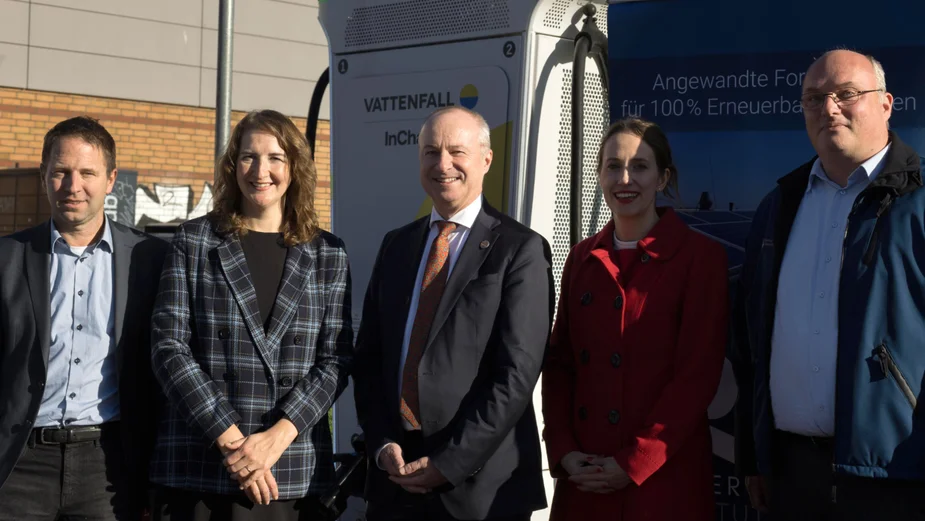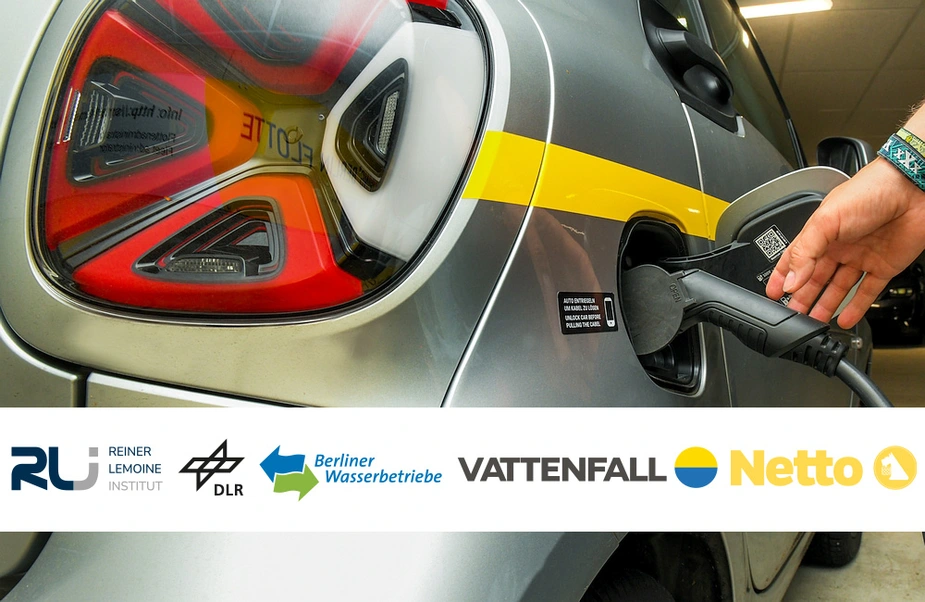How supermarket parking lots help the energy supply in Berlin
Research project shows innovative solutions for electromobility
Supermarket parking lots can help reduce the need for expansion of charging infrastructure in public spaces in Berlin by up to 17 percent. In the Retail4Multi-Use project, scientists from the Reiner Lemoine Institute (RLI) and the Deutsches Zentrum für Luft- und Raumfahrt (DLR) have developed multi-use concepts for electromobility. These can also increase the efficiency of existing charging points by up to 255 percent. In the future, a new digital matching platform will help to broker charging partnerships. Interested actors for partnerships could already be identified during the project. A first charging cooperation between Berliner Wasserbetriebe and the energy supplier Vattenfall in a parking lot of the trading company Netto is in preparation.
Christian Hirte, Parliamentary State Secretary at the German Federal Ministry of Transport, says about the project: “With the Retail4Multi-Use project, we are showing how charging infrastructure can be used efficiently by supermarket customers and fleet operators. This multiple use has great potential: customers charge while shopping, and the charging infrastructure is available to commercial users outside opening hours. The mediation platform developed for this purpose is an innovative approach that will be pursued in the future.”
“We have determined which concepts can help to use charging infrastructure in supermarket parking lots more efficiently. Our results are particularly useful for commercial players with vehicle fleets, but without sufficient in-house charging infrastructure. They facilitate the electrification of the vehicle fleet through better access to charging infrastructure and support operational processes,” says Friederike Reisch, Head of the Mobility with Renewable Energies research department at RLI.
“Some colleagues from the laboratory or metering, for example, often have long tours throughout the city. The multi-use concept enables us to quickly charge close to places of use and can thus save travel time to depot charging at the local depot,” says Nils Brätsch from Technical Service / Fleet Management, who has been supporting the project on behalf of Berliner Wasserbetriebe since 2023. “This can also be transferred to other companies,” says Brätsch.
“Supermarket parking spaces are a decisive lever for bringing electromobility into everyday life. Together with partners such as Netto, we are showing here how high-performance fast charging can work in urban areas – close to everyday life, grid-friendly and with 100 percent green electricity. For us at Vattenfall, one thing is clear: people want to charge where they are anyway – when shopping. That’s why we are making targeted investments in high-quality retail locations and linking them to smart charging to relieve grids and reduce costs. Today’s example shows how research and practice can work together to advance the energy transition,” says Annemarie de Jong, Director Sales & Operations Vattenfall E-Mobility Germany.
Michael Linander, CEO Netto Germany says: “As part of our corporate strategy at Netto, we prioritize climate awareness and sustainable solutions. By expanding the charging infrastructure in our car parks, we are creating real added value for our customers and our colleagues as well as for our common home.”
“With our analyses and predictions of the requirements and needs of the stakeholders involved, we were able to contribute the necessary basis for identifying efficiencies in Berlin’s important charging infrastructure development,” says Jan Grippenkoven, Head of the Transport Department at the DLR Institute of Transport Research, explaining the research results.
By 2045, Berlin will need around 330,000 charging points
The project’s calculations show that Berlin is expected to need around 330,000 charging points by 2045 to supply around 1.4 million electric cars and light commercial vehicles in the city. This is a tenfold increase in the current number of charging points. The demand in non-publicly accessible spaces, such as private parking lots, will be about four times higher than in public spaces. Better use of existing charging infrastructures can therefore relieve the burden on the expansion and ensure a better supply of electricity to e-vehicle users. The potential of charging events that can be shifted to charging infrastructure at retail locations is up to 3500 MWh per week in Berlin for 2035. This corresponds to the energy needs of almost 45,000 households in the same period.
For the charging demand analysis, the project team used synthetic driving profiles from real mobility data and simulated the results with the open source tool SimBEV developed by RLI and the DLR tool CHARGIN.
Online platform helps arranging charging partnerships
As a further result, the project team has developed a matching platform together with the project partner Localiser RLI. This digital application helps to mediate partnerships between fleet operators and charging infrastructure operators. Interested parties can register via the link https://app.localiser.de/de/register/r4mu and then search specifically for cooperation partners in order to initiate joint charging cooperations. The results of the project can also be used for other urban centres beyond Berlin.
Contact:
Reiner Lemoine Institute
Friederike Reisch
Project Leader
Deputy Head “Mobility with Renewable Energy”
friederike.reisch(at)rl-institut.de
Timo Beyer
Communication
030 12084 3415
presse(at)rl-institut.de
RLI press release, 14 October 2025

